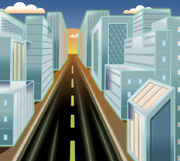
The Solar highway is an intelligent road that provides clean renewable energy, while providing safer driving conditions, along with power and data delivery. The Solar Roadway will pay for itself through the generation of electricity along with other forms of revenue.
The same money that is being used to build and resurface current roads can be used to build the Solar Roadways. Then, since coal-fired and nuclear power plants will no longer be needed, the costs of all electricity generation plants can also be rolled back into the Solar Roadways .
Imagine driving on a road paved not with asphalt but with glass. And within this glass are photovoltaic cells that transform sunlight into electricity and send it directly to the homes lining the street. That’s the aim of an Idaho-based company called Solar Roadways. And before you dismiss the notion as impossible, you might be astonished to know that the company has federal funding and is currently leading the GE Ecomagination Powering Your Home Challenge, a program that promotes energy innovation.
“There’s 25,000 square miles of road surfaces, parking lots and driveways in the lower 48 states. If we covered that with solar panels with just 15 percent efficiency, we’d produce three times more electricity than this country uses on an annual basis, and it’s almost enough to power the entire world,” said Scott Brusaw, co-founder of Solar Roadways, in a segment of Your Environmental Road Trip, a new film that explores cutting-edge energy solutions.
Though many think driving on glass wouldn’t work, materials scientists beg to differ. Window glass is only one of countless forms glass can take. If specially manufactured, its strength can be that of steel and ideal for driving on.
“In dry conditions … there would be few surfaces better for a roadway than glass,” wrote the Pacific Northwest National Laboratory’s Joseph Ryan, a specialist in materials science, in a paper titled Energy Solutions from Glass Road Surfaces. This changes when water is introduced; however, that problem could be mitigated. “Molten glass can easily be molded into shapes specifically designed to maximize the run-off of water and maximize tire-roadway contact in wet conditions,” he said.
Solar Roadways has built a 12-foot-by-12-foot prototype. Not only does the panel generate energy, it also lights up, creating a safer nighttime driving experience.
It’s innovative solutions like Solar Roadways that many hope will serve as the foundation of our energy future. There won’t be a handful of energy sources — coal, oil, nuclear — like we have today. Rather, an entire ecosystem of energy technologies will work together to power our world.



